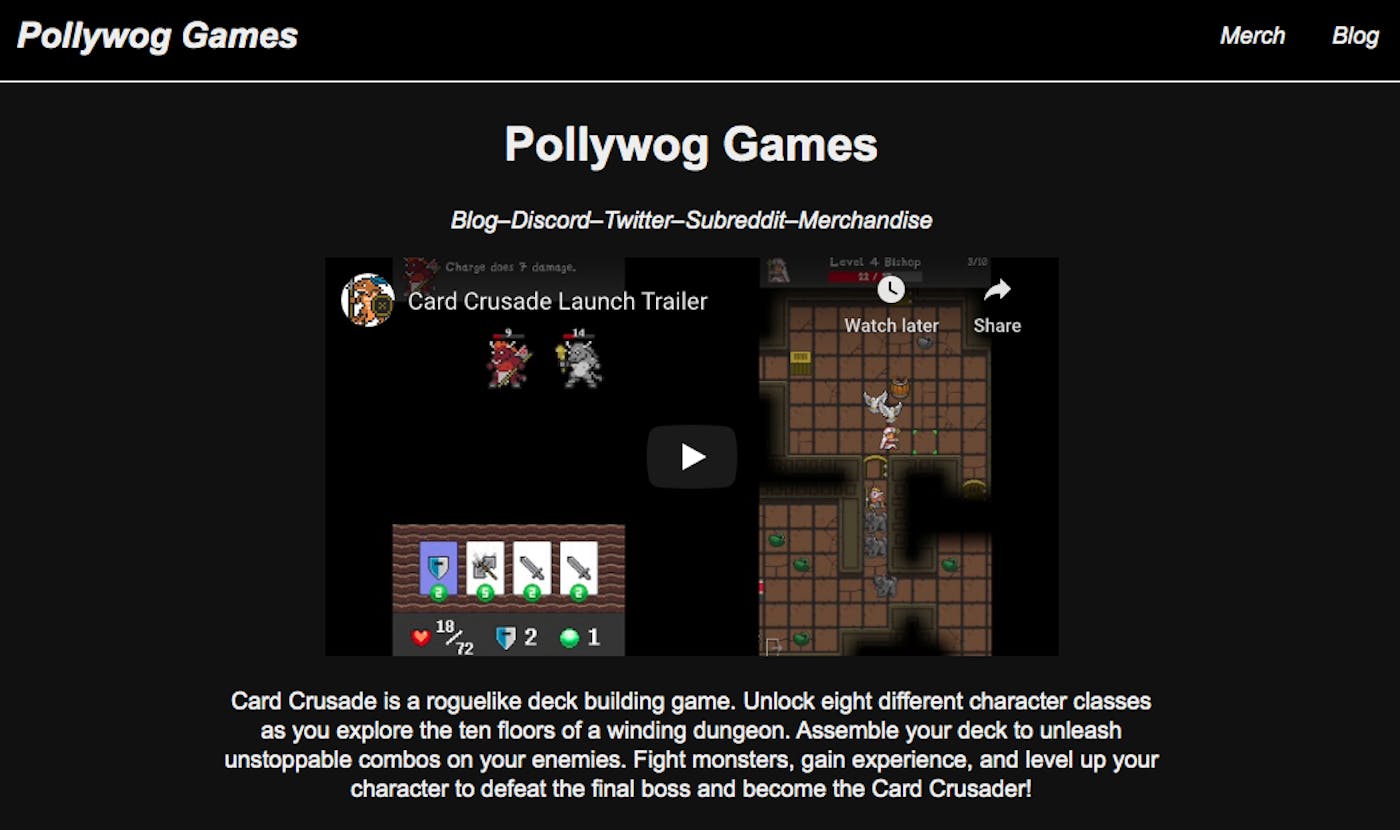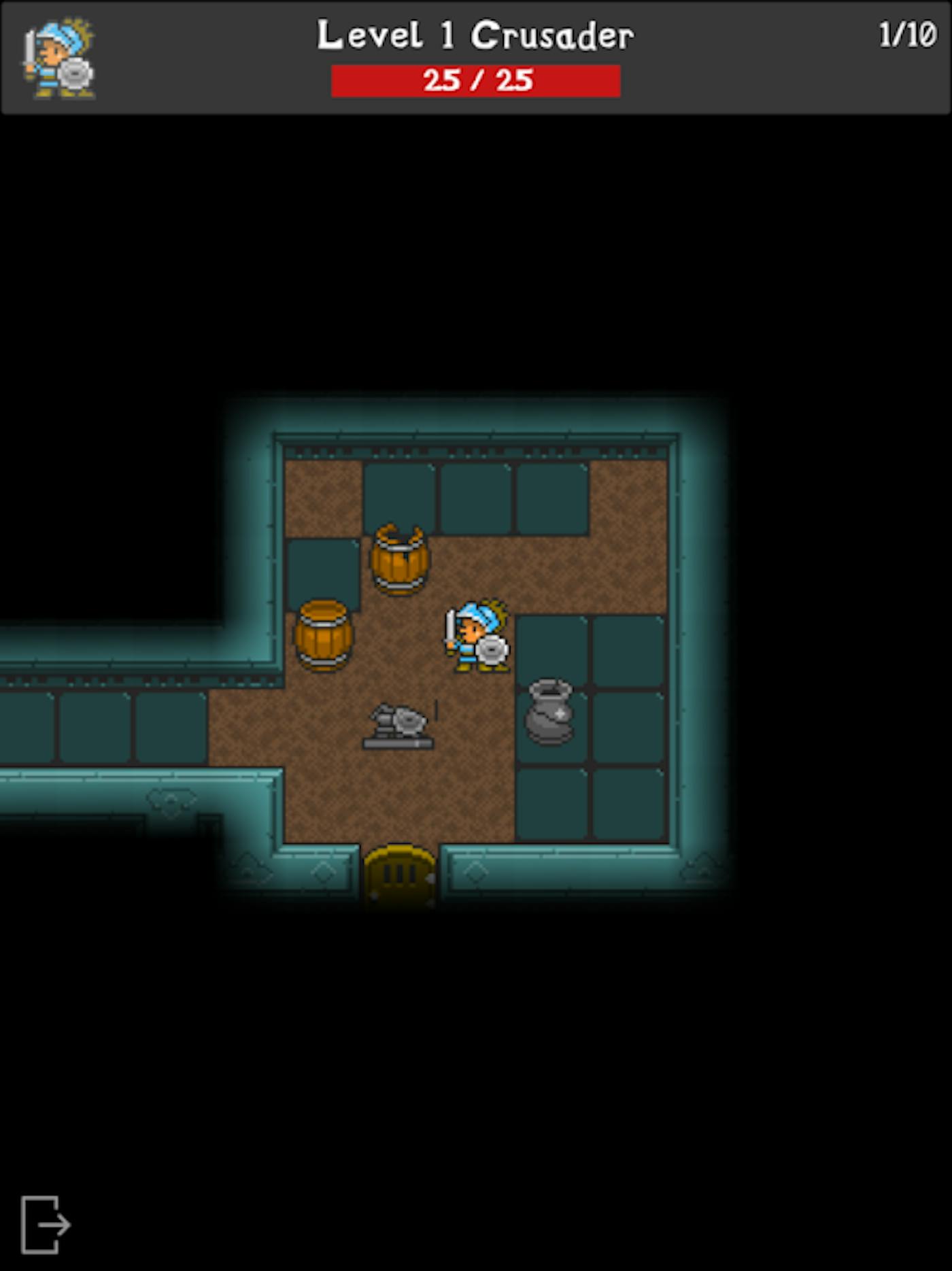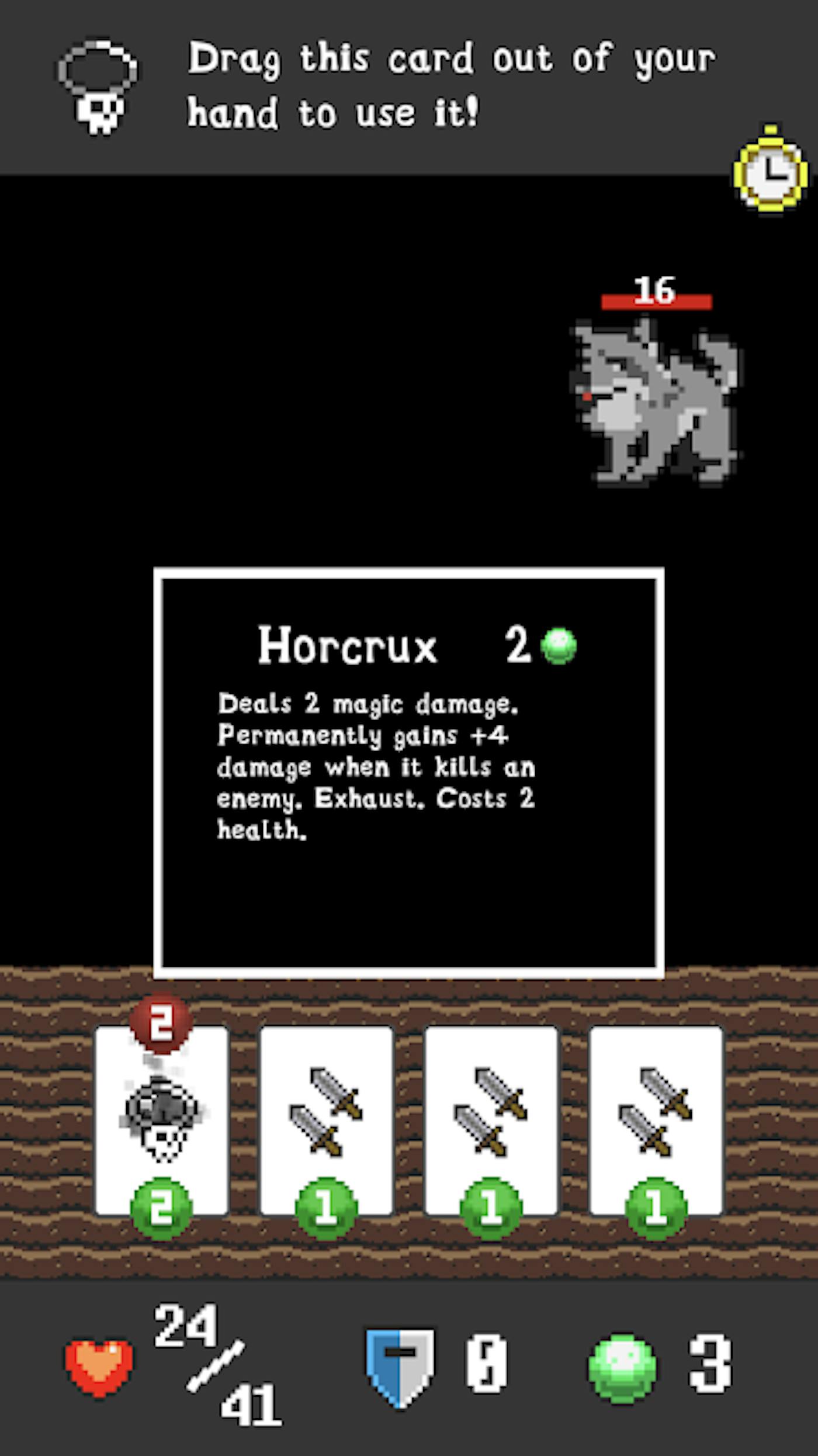How We Created a Profitable Game, Just to Prove That We
Could
What's your background, and what are you working on?
My name is Lincoln, and I am a programmer from Utah. I recently graduated with a Computer Science degree from Brigham Young University. I have been programming since I was 12 years old and playing games long before that, so making games was a natural draw for me. In high school I was known for making and distributing games on my TI-84+ graphing calculator during physics class.
My brother Jan and I decided about two and a half years ago that we wanted to make a game for real, and release it for all of our friends to play. After many, many hours of planning and deliberation we decided to make a mobile game that would be a combination of two of our favorite games: Slay the Spire and Pixel Dungeon. It would be a roguelike deck builder called Card Crusade. Jan and I worked for the same company at the time, so we would take long lunch breaks and plan out our game.
Fast forward to today, our game has been on the market for a year and a half and netted us $10,000+ USD over its lifetime. After development expenses and app store cuts it looks more like $6,000 today. Now we're working on some new games and the money has let us buy some new assets and pay freelancers for our current projects.
What motivated you to get started with Card Crusade?
Jan and I have both been playing video games for as long as we can remember, so it only made sense for us to make something we would both enjoy having. I have also always wanted to start a business, and making a game seemed like an easy way to check that off the list.

We came up with the idea for our specific game, Card Crusade, by mashing together our favorite games and imagining what the end result might look like. Eventually we made an early prototype to validate the idea and it got a lot of upvotes on r/gamedev on Reddit, so we felt good enough to keep building it. As development continued, we kept posting on Reddit and made a point of following up individually with everyone who commented on our posts.
Within three months of having the idea, we created an early alpha release and distributed it to our followers. We had a relatively active Discord server during our beta development phase that we used to communicate with players and get feedback. This also helped us stay motivated to keep making the game while working day jobs and going to school.
What went into building the initial product?
We were both very busy when we decided to work on this project -- Jan with a full time job, and me with a part time job and a full time course load at school. We also had no budget, because we had no idea how much money mobile games typically make. But we really wanted to do it, so we found time on evenings and weekends to make it happen.
The development timeline looked something like this:
- Decided to make a game (Jan 2017)
- Came up with an idea (March 2017)
- Created initial prototype and posted demo online (April 2017)
- Distributed early alpha release (May 2017)
- Shipped beta releases monthly based on user feedback (June - November 2017)
- Shipped early access release on both app stores (December 2017)
- Developed new features, bug fixes, and improvements (January 2018 - February 2018)
- Left early access and promoted on review sites online (March 2018)
- Post-release update with new content (May 2018)
- Second post-release update with new content (September 2018)
What's your tech stack?
The game itself is written in Unity, because we didn't want to write separate versions of the game for each platform. The server, which primarily stores high scores, is written in Python, with the Flask framework, and a SQLite back end, running on an OVH virtual private server.
We chose these technologies because they were good enough for our low scaling requirements, they're easy to deploy and because they're what we are familiar with.
Why did you choose the platform you use for your games?
We chose to develop a mobile game because it would be most accessible for our friends. In my opinion, mobile gaming can be a bit of a wasteland if you only look at what big studios like Disney are doing. Every game by those studios feels like yet another copy of Clash of Clans, Clash Royale, or Candy Crush. PC gaming on the other hand is incredibly rich and there are so many great games to spend your money on. It felt (and still feels) like an untapped opportunity to bring the quality and interestingness of PC games to mobile.
Plus, as non-artists there is less screen real estate to design for, and we can get away with simpler sprites :)
How have you attracted users and grown Card Crusade?
Besides friends and family, our primary way of attracting users in the beginning was via Reddit; we would make a post with something cool from our game and then individually message everyone who left a comment, asking if they wanted to be a beta tester.
We also did a big PR push when we came out of early access and got positive reviews on Touch Arcade, Pocket Gamer, and a few other well known review sites. Touch Arcade in particular was huge for us, half of our gross revenue (approx. $5,000) came from March 2019 after those reviews came out.
We experimented with Facebook and Reddit ads, but they were too expensive for the small boost in user sales that the ad campaigns brought. You can read details of our Facebook ad campaign, including how much money we spent and how many units we sold, on our blog.
I am religious about recommending Card Crusade to anyone I see on Twitter that asks for game recommendations, especially when they ask for similar games to Meteorfall, Card Crawl, Dream Quest, Slay the Spire, etc.
Some users have told us that they found our game in the App Store's "Games You Might Like" section, which I believe is individual to each user and based on their purchase history. Unfortunately, we never received any direct promotions from the App Store. I believe a front page promotion would have 5xed our revenue, at least.
What other games inspired your games?
A lot of games resemble Card Crusade superficially but we were mostly inspired by Slay the Spire and Pixel Dungeon.
We called out our specific influences in our original app store listing, but Apple told us we couldn't use trademarked names in the app description!
What's your business model, and how have you grown your revenue?
We intentionally chose the simplest monetization model: a one-time fee up front to download the game. No in-app purchases or advertisements appear anywhere in the game.
This was mostly because of ease of implementation.

Why games over another industry?
Video games have the lowest barrier to entry of any business model that I know of (besides maybe a lemonade stand). You can whip something up in Unity and list it on the game store within minutes. Especially if you choose the premium pricing model like we did. Then you don't have to figure out how to set up ads, subscriptions, in app purchases, or anything. Just set an up-front cost and connect your bank account.
It ended up being a little bit more work for us because we wanted to form an LLC and set up a separate business banking account, but none of that is strictly necessary to get started. I would guess the majority of solo indie game developers on the app store are sole proprietors.
All of that is to say, as our first foray into starting a business, it made sense to chose something easy so we could set ourselves up for success. Gaming is a tough industry to be in because the market is extremely saturated, but our goal wasn't to quit our day jobs, it was simply to make a little money online and to have fun.
How has your education played a role in creating games?
Jan and I are both just regular computer programmers. My degree is in Computer Science, and his is in Computer Engineering. We're both software engineers for our day jobs and neither of us has any technical background in graphics. That has led us to make mostly 2D/Arcade style games.
The 3D graphics pipeline is really interesting to me but also very daunting. I don't know anything about 3D modeling, rigging, animation, rendering, etc. So our games are simple and flat (and the art is usually a bit lackluster, unfortunately.)
What are your goals for the future?
Now that we're done working on Card Crusade, Jan and I are working on new game projects that will be releasing later this year.
I am working on a casual multiplayer game similar to Jackbox Games, and Jan is working on a multiplayer turn-based strategy game called Barnard's Star. Think Starcraft meets Chess, and you have Barnard's Star.
What are the biggest challenges you've faced and obstacles you've overcome?
The biggest challenges by far were:
a) finding the motivation and time to finish the project in the first place
b) getting people to download the game and give it a try
We overcame these mostly just through perseverance and a little bit of cleverness, although I am still thinking of ways to promote the game so more people see it.
I don't think I would have done anything differently. The goal of this project was simply to get something out there, to prove I could start and operate a simple business, and to have fun, and we achieved those goals!
Have you found anything particularly helpful or advantageous?
There are tons and tons of resources online for game developers these days. In particular, I was motivated by the stories of other programmers who were doing something similar to us.
Here are some websites and articles that motivated me in the early days and helped me figure out what to expect:
-
Amir Rajan's legendary story of quitting his job and making the viral game A Dark Room
-
Slothwerks's blog on Medium, in which he cites revenue numbers and development timelines for his projects
-
Arnold Rauers of TiNYTOUCHTALES, who makes a great living making small premium games
-
Ryan Clark's talk, "How to Consistently Make Profitable Indie Games", as well as his "Clark Tank" series on YouTube
-
Jake Birkett, "How to Survive in Gamedev Eleven Years Without a Hit"
-
Jeff Vogel's "Failing to Fail: The Spiderweb Software Way"
Before starting Card Crusade, neither of us knew how to use Unity either, so we're very grateful to the countless tutorials and great documentation online for that platform.
I also frequented r/gamedev very frequently, read every post, and commented with questions for other developers with similar stories. Besides what's on the internet, I went to one game dev meetup IRL, but it turned out to be a big waste of time.
What game developers do you look up to?
Slothwerks and TiNYTOUCHTALES are two of my role models because they are doing exactly what I am doing, but much more successfully.

Slothwerks made something like $100k on his game Meteorfall, and Arnold Rauers (TiNYTOUCHTALES) is incredibly successful with his games Card Crawl, Miracle Merchant, and others. They both blog a lot and talk about their games on Twitter, and they were very helpful to us as we were making Card Crusade.
What types of games do you tend to play?
I have the most hours in Brawlhalla, Nuclear Throne, and Slay the Spire. Jan has the most hours in League of Legends and Hollow Knight. With the exception of League of Legends, we almost exclusively play indie games. Jan might play more AAA games than me. I just think indie games are the most interesting and unique (not to mention, the easiest to afford)!
What's your advice for indie hackers who are just starting out?
You can always find time to do the things you really want to do! When people say they are "too busy", it is almost always just an excuse. You don't need any more than an hour a day to work on your idea. And most people spend at least an hour on social media or watching TV every day anyway.
Where can we go to learn more?
The best way to communicate with us and learn what we're working on is to join our Discord server.
We are also very active on Twitter, on two accounts:
Pollywog Games
Barnard's Star (our new multiplayer turn based strategy game)
We're also happy to answer questions below!

It is helpful!